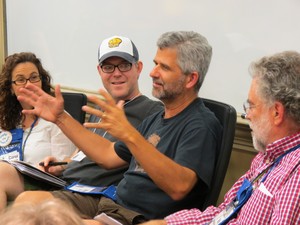How do Presbyterians minister to people who write down the letters SBNR ― spiritual, but not religious ― when describing their church affiliation?
Do they even want to be ministered to?
A quartet of people who have grappled with the issue ― Carol Howard Merritt, author and conference keynoter; Landon Whitsitt, executive and stated clerk for the Synod of Mid-America; Mark Davis, pastor at Heartland Presbyterian Church in Clive, Iowa and author of Left Behind and Loving It; and Bill Humphreys, chaplain at Carroll University in Waukesha, Wis. ― addressed the topic during a panel discussion this week at Synod School, hosted by the Synod of Lakes and Prairies and attended by about 660 people.
The group was asked to respond to Linda Mercadante’s article “The Seeker Next Door,” published May 30 by The Christian Century magazine.
People are finding something like church in nontraditional places, and Davis attended one in Ames, Iowa recently, where he watched his son perform electronic music in a place called The Space. The final number was a powerful poem set to music. After that,Davisrecounted, the audience passed the peace and received a benediction.
“It was a very spiritual experience of people looking for truth in the world,” Davis said. “I didn’t hear the words ‘God’ or ‘Holy Spirit,’ and I did hear the ‘f’word a couple of times. This was real, not a bunch of idealistic young people who will grow up to go to proper church someday.”
Davis said church-goers should engage in dialogue with the SBNRs. “In dialogue, the church’s mind gets changed too,” he said. “When we talk to SBNRs, they will ask us to get beyond theism. We like God the way Gary Larson [creator of The Far Side] draws God, but we’re talking about people in whom God is already at work.”
Chapel services aren’t mandatory at Carroll University, so not many students regularly attend, Humphreys said. But he sees students expressing spirituality in service organizations such as Circle K International and Habitat for Humanity.
“For a lot of people, church, religion and Christianity are defined by their experience with TV and radio,” he said. “I am on the side of students who don’t want to be Christian when being a Christian is informed by some of those voices.”
Whitsitt said young adults often tell him that “I am trying to be religious, but all I really want to be is spiritual.”
“If the purpose is to maintain religiosity, then we’ve failed,” he said. What resonates for Whitsitt is God’s thundering as reported by the prophet Amos: “I despise your solemn assemblies.”
“I don’t need people to hang out and be religious. They should give their pew back,” he added. “I see too much good in the fact that when women and men gather, something happens and we call that church. I want to know what that something is.”
Merritt said she’s raising her daughter in church “not because I want her to be morally superior or to have particular political beliefs. I want her to have an inner sense of wholeness and connectedness and the ability to pray and feel part of a larger community. I want her to be filled with love for God, and I find that to be in church.”
“It’s important,” she added, “to listen to a generation and the culture talking about this ― not only what we think it means, but to really listen to what they are saying.”
Mike Ferguson is a ruling elder at the United Presbyterian Church of Lone Tree (Iowa), a reporter for “The Muscatine Journal”― the newspaper where Mark Twain got his start ― editor of “Out and About, the enewsletter of the Presbytery of East Iowa, and a frequent contributor to Presbyterian News Service.

